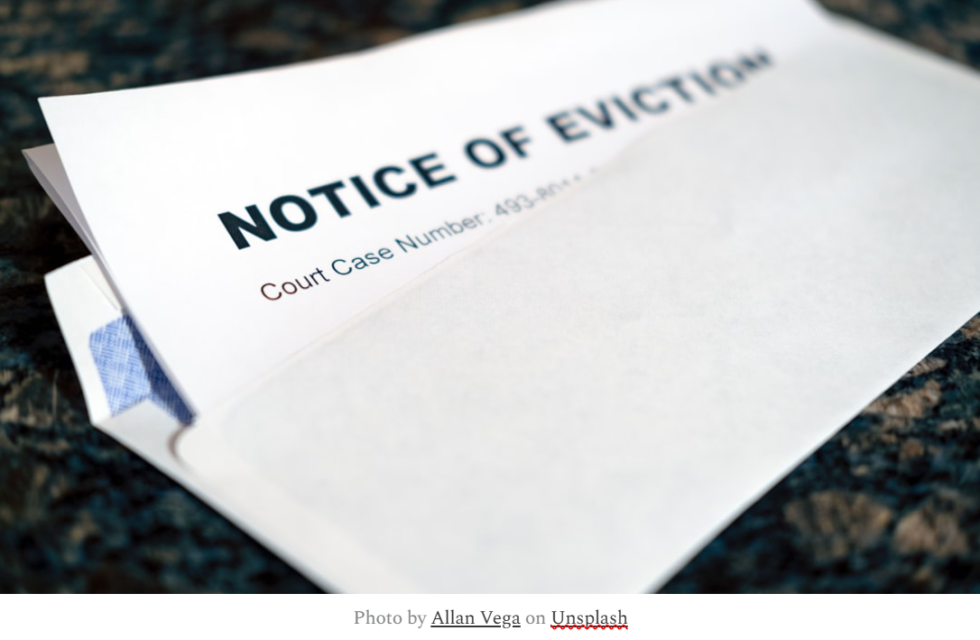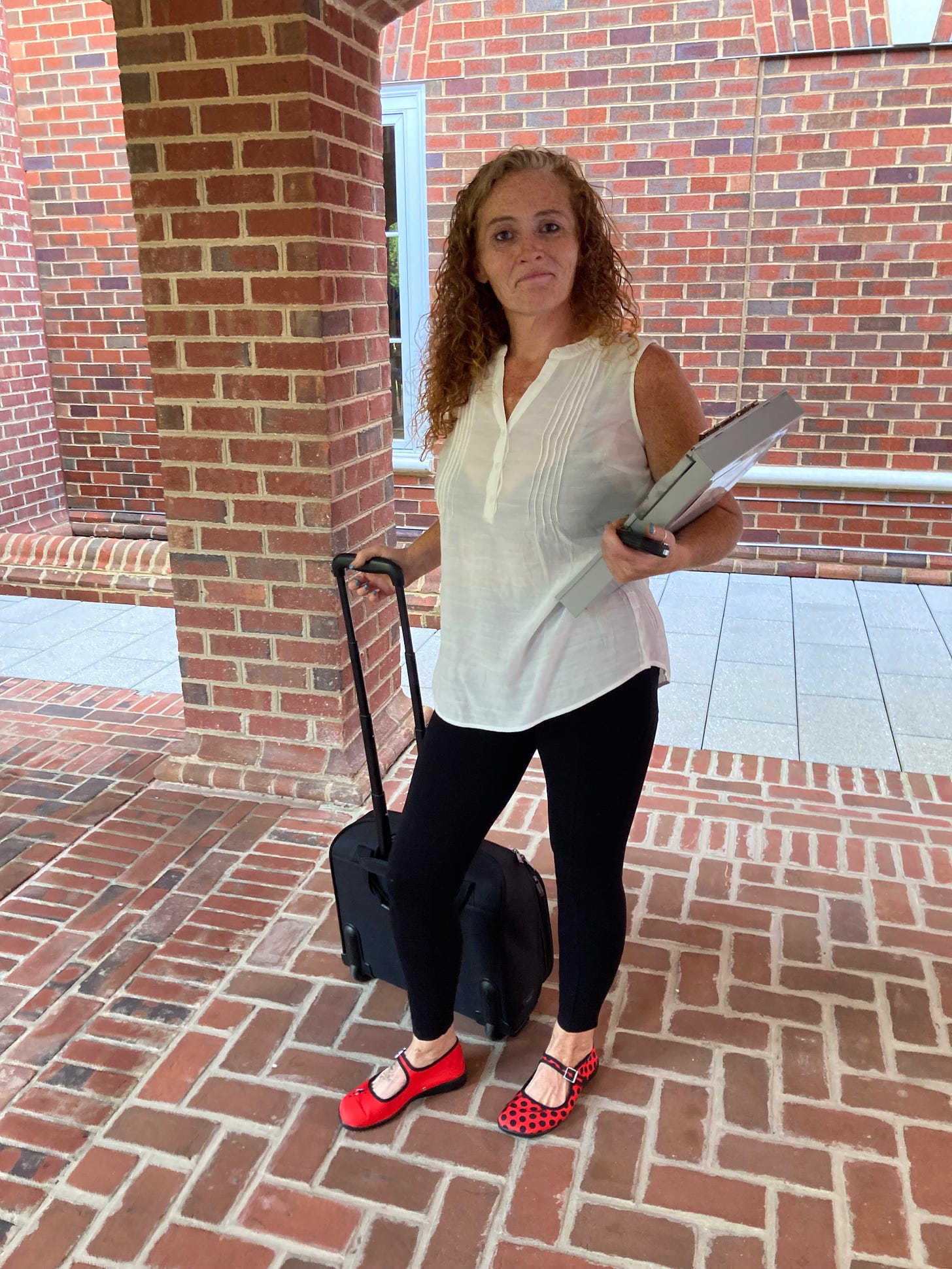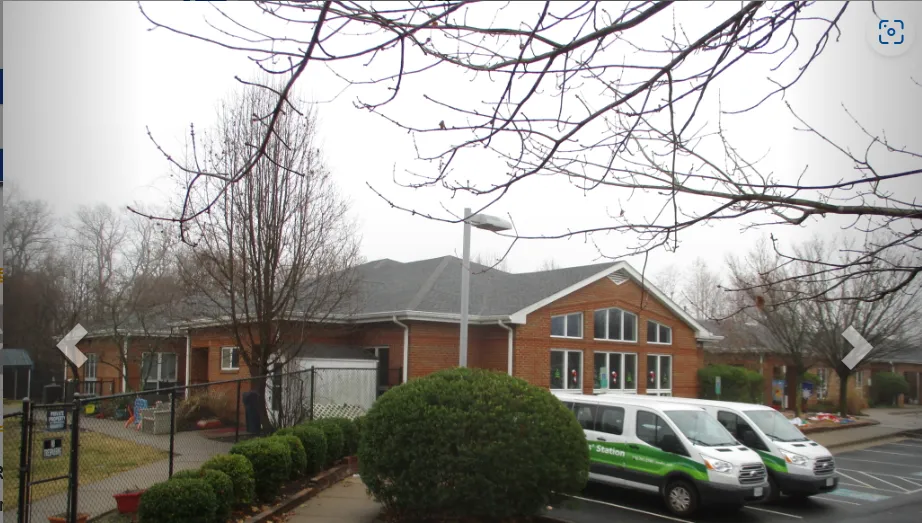
As evictions rise – especially in Fredericksburg, Spotsylvania, and Stafford – the challenges for renters multiply. So does the need to support them in court.
Julie Mitchell scanned the clusters of people gathered outside courtroom #2 in Stafford County General District Court on the morning of Monday, July 22.
Mitchell, a paralegal with Legal Aid Works, clutched a stack of copies of the organization’s 2024-25 Guide to Virginia Landlord-Tenant Law and applications for Legal Aid’s free services.
She also had a printout of the names of all individuals facing the charge of “unlawful detainer” on that morning’s docket.
Mitchell explained what she was looking for as she scanned the crowd.
“I don’t approach people who are with attorneys, or people with cell phones, because those are attorneys,” she said. “Everyone else, I’ll go up to. Often, I’ll ask, ‘Are you here for an eviction?’ and they’ll say, ‘No, I’m here for an unlawful detainer,’ not knowing those are the same thing.”
Mitchell said she often sees the same people at the eviction docket month after month.
“Once you get behind, catching up is so hard,” she said. “And with some of these bigger [apartment] complexes, it’s like an eviction mill.”
Mitchell approached a man and introduced herself. She explained that Legal Aid can provide free representation in civil cases to qualifying individuals and asked if he would be interested.
“There are ways you can hold your landlord accountable,” she said, as she handed him a copy of the guide to landlord tenant law and the application.
The man told the Advance that he’d recently lost his job. His brother-in-law had crashed his car, he said, and he had no way to get to his work in Fauquier County, about 41 miles away from his home in Stafford’s England Run community.
He’d been out of work for a month and was behind on his rent. He said he owes about $3,000 in back rent and late fees—and now court fees, as well.
“I told them I would be late,” the man said. “I’m trying to pull money out of my 401k to cover what I owe. I just need more time.”
Alex Reidell, Legal Aid Works’s managing attorney and one of two attorneys who work on housing matters, hears this same story month after month after month.
“The vast majority of the time, people just need more time,” Reidell said.
Approaching pre-pandemic levels
Legal Aid Works provides services to Fredericksburg City and the counties of Stafford, Spotsylvania, King George, Caroline, Westmoreland, Northumberland, Richmond County, Lancaster, Essex, King and Queen, King William, Culpeper, Orange, Madison, Rappahannock, and Fauquier.
The team conducts outreach at as many eviction dockets as possible.
“The legal system is not designed to provide [information about their rights] to tenants because there is no right to representation when the tenants face homelessness,” said Ann Kloeckner, Legal Aid Works’s executive director.
The system “is designed to resolve disputes, not to educate tenants about their rights or advocate for them against landlords,” Kloeckner said. “Without an advocate to explain the tenants’ rights to them and navigate the court system for them, tenants do not have a level legal playing field on which they can operate.”
Virginia implemented a moratorium on evictions from March to June of 2020, as a response to the COVID-19 pandemic. The state put further protections for tenants in place from August to September of 2020 and then from January through June of 2021. These were renewed again from August 10, 2021, to June 30, 2022.
“Eviction filings remained low in the state during these periods, but have increased since these protections were lifted,” according to Princeton University’s Eviction Lab, which tracks eviction and eviction filings in a handful of states, including Virginia, and a handful of cities, including Richmond.
Virginia, with just over 1 million renters, has an eviction filing rate (the number of evictions filed per 100 renters) of 13%. That’s the highest rate of the 12 states Eviction Lab tracks. The next highest is Delaware, with 11%.
Statewide, filings have hovered at 80 to 85% of the pre-COVID average from September of 2022—shortly after the pandemic protections finally expired—to May of 2024, according to Eviction Lab.
Locally, Reidell said, the rate of evictions is approaching pre-pandemic levels, with highest numbers in the City of Fredericksburg, and Spotsylvania and Stafford counties.
‘All too common’
The process of eviction for nonpayment of rent begins with a notice from the landlord giving the tenant five days to “pay or quit.”
The Coronavirus Aid, Relief, and Economic Security Act extended this notice requirement to 30 days for properties that participate in certain federal housing programs or have a federally backed mortgage loan. There’s no sunset date to this requirement, according to the National Housing Law Project, yet it’s not always enforced by courts—88% of respondents to a 2022 NHLP poll reported inconsistent or no enforcement of the requirement by judges.
For this reason, the Legal Aid team highlights the names of defendants living in federally subsidized housing on the printed docket they take with them when they provide court outreach.
If the tenant fails to pay rent after receiving notice, the landlord can file a request for General District Court to issue a “summons for unlawful detainer,” advising the tenant to appear in court on a certain date.
The District Courts in Stafford and Spotsylvania schedule hearings on these summonses at least once a week. Fredericksburg, Caroline, and King George hear them twice a month.
According to Legal Aid Works’ guide to landlord-tenant law, if the tenant does not appear in court on the scheduled hearing date, “the court will enter a default judgement for the landlord,” meaning it will order the tenant to vacate or “face forcible eviction by the sheriff.”
“That’s unfortunately all too common,” Reidell said.
About 15 minutes before the start of the 9 a.m. docket, Mitchell had given out four applications for free legal aid to defendants facing “unlawful detainer” summonses.
“I’ve received three back,” she said, which is about typical. The defendants who are eligible for representation are given the opportunity to have a brief consultation with Reidell that morning before going into court, and sometimes he is able to represent them in court before the judge.

Mitchell said that having representation from a Legal Aid attorney in court “almost always” changes the odds against the defendant.
But she said that individual judges differ in whether they make it easy for Legal Aid to be a part of the process.
In Stafford and Spotsylvania, Mitchell said, “because we do this so often, the judges know we’re here.”
She tells defendants that, on the off chance they’re called before the judge before Reidell has a chance to consult with them, they should let the judge know that they plan to speak with Legal Aid.
Local judges often will give defendants time to speak with a Legal Aid attorney before calling them back up, Mitchell said.
“But some judges don’t offer that,” she said. “Some of them are like, ‘It’s time to face the music.’”
Mitchell continued, “Some judges are good at explaining that Legal Aid should be part of the process, and some aren’t. It’s weird how much is up to interpretation.”
Immediate possession
Judge Jane Reynolds presided over the docket in Stafford on July 22. Attorneys for apartment complexes sat along one wall of the courtroom and went before Reynolds one-by-one to present the unlawful detainers brought by the companies they represent.
There were 63 unlawful detainers on the July 22 docket in Stafford General District Court. Of those cases, 13 resulted in default judgements, meaning the tenant wasn’t present and the judge automatically awarded possession to the landlord.
In two more cases, tenants were present, but possession was still awarded to the landlord.
Those 15 tenants—representing almost 24% of the unlawful detainer cases heard that day—now owe overdue rent ranging from as little as $812 to as much as $7,143, plus 6% interest from the date of judgement, plus court fees of $69, plus attorney fees of $200, plus miscellaneous other fees in some cases.
They also face being forcibly removed from their homes by the sheriff’s office and having an eviction judgment on their record, which affects their credit and will make it harder for them to find housing for years going forward.
None of the defendants in the July 22 unlawful detainer cases had an attorney, aside from the three represented by Legal Aid.
“It’s very, very rare for those who don’t apply for our services to have an attorney,” Reidell said. “Most of these cases are for unpaid rent, and if they have the money for an attorney, they would have had the money for the rent.”
In all but two of the July 22 cases, the judge awarded immediate possession, meaning the landlord can “go right away to the clerk and have a writ of eviction prepared,” Reidell said.
If immediate possession isn’t awarded, the landlord has to wait 10 days to ask for the writ of eviction, during which the tenant can appeal the judgment to the Circuit Court and pay outstanding rent and fees.
Even when immediate possession is granted, Reidell said, “The trick is that eviction still can’t happen within those 10 days.”
This is one of the pieces of information Reidell makes sure clients understand when he talks to them before court.
“Even if there’s no way to stop judgment against [them], I can say, ‘Here’s what your right to redeem [the right to stop the eviction by paying outstanding rent] is and here’s the eviction timeline,” Reidell said. “The landlord has to jump through these hoops, so you have some time to scramble to come up with the money if that’s possible.”
Twenty-six of the July 22 unlawful detainer cases were dismissed and 21—including the three that Reidell took—were continued until August.
Advice from Legal Aid Works
Though they might feel like the odds are stacked against them, Reidell advises anyone facing a summons for unlawful detainer to come to court.
“Even if you don’t have a lawyer or any legal defense or questions of fact, I advise everybody to always show up in court,” he said. “If nothing else, they’re present, and they’re aware of what can happen just in case the other side tries anything funny … [and] they can at least stand up for themselves.”
In cases where a default judgment is entered because the tenant wasn’t present, the landlord’s is “the only story the judge is hearing,” Reidell said. “So, if [the other side] makes something up, there’s nobody there to say, ‘Wait a minute, this isn’t right.’”
Being present in court also gives the tenant an opportunity to talk to the landlord’s attorney which can result in a request to continue the case to the next docket and give the tenant time to come up with the money.
Legal Aid Works also recommends that tenants make sure to discuss problems with their landlord and to get agreements from their landlords in writing.
According to the organization’s guide to landlord-tenant law, landlords are responsible for:
- supplying hot water, air conditioning, and heat
- keeping all electrical, heating, plumbing, sanitation, ventilation, air conditioning, and other facilities in working order
- keeping common areas clean
- preventing the accumulation of moisture and mold
- providing appropriate receptacles for collection and removal of garbage
- complying with applicable building, housing, health, and fire codes.
Reidell said he often sees tenants end up in court because they have stopped paying rent due to landlords not making needed repairs.
“It’s a perfectly reasonable, understandable thing for tenants to do,” he said. “People are thinking, if someone is not following through on their end of the bargain, why should I? But the problem is that in Virginia, the landlord still has the right to rent money even if these conditions are going on.”
In order to not fall into this “all too common trap,” Reidell said, tenants can file a “tenant’s assertion”—an official complaint against a landlord for failure to fulfill an obligation—and pay rent to the court to be held in an escrow account, instead of to the landlord.
“This is a great tool to get the landlord’s attention,” Reidell said. “It proves that, yes, this problem exists and yes, I let the landlord know about it. And they still haven’t fixed it.”
To apply for representation from Legal Aid, visit LegalAidWorks.org or call 540/371-1105
Follow us on Facebook | Instagram | Youtube

Local Obituaries
To view local obituaries or to send a note to family and loved ones, please visit our website at the link that follows.

Support Award-winning, Locally Focused Journalism

The FXBG Advance cuts through the talking points to deliver both incisive and informative news about the issues, people, and organizations that daily affect your life. And we do it in a multi-partisan format that has no equal in this region. Over the past month, our reporting was:
$8 a month supports great journalism
- First to report on a Spotsylvania School teacher arrested for bringing drugs onto campus.
- First to report on new facility fees leveled by MWHC on patient bills.
- First to detail controversial traffic numbers submitted by Stafford staff on the Buc-ee’s project
- Provided extensive coverage of the cellphone bans that are sweeping local school districts.
- And so much more, like Clay Jones, Drew Gallagher, Hank Silverberg, and more.
For just $8 a month, you can help support top-flight journalism that puts people over policies.
Your contributions 100% support our journalists.
Help us as we continue to grow!





